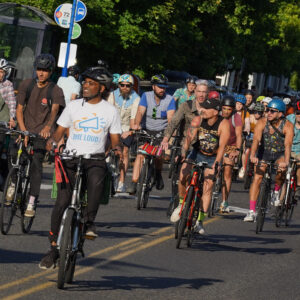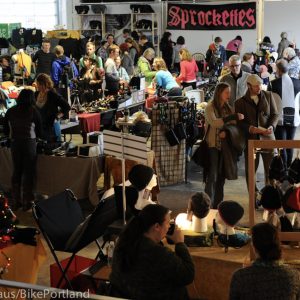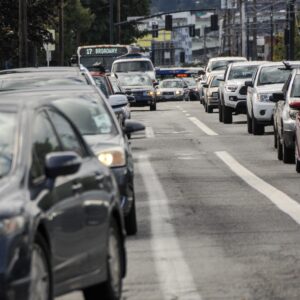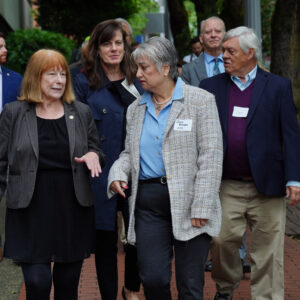
Stumptown Coffee founder Duane Sorenson makes regular trips to farms around the world to source his prized beans. On a recent trip to a coffee co-op in Rwanda, he asked one of the farmers if there was anything Stumptown could do to help them out.
The answer? He just wanted a bike.
This request resonated with Sorenson and with the help of some of his bike-loving clientele back in Portland, Bikes to Rwanda was born.
The new group’s mission is to,
“Provide cargo bicycles to co-operative coffee farmers in Rwanda. The goal is to improve quality of life in these communities through a bike workshop and maintenance program that provides transportation resources for basic needs and enhances production of quality coffee.”
Not only would bikes offer reliable and cheap transportation, but according to Bikes to Rwanda they can have a huge impact on the farmer’s lives,
“Bicycles will allow the farmers to move coffee cherries from harvest through the various stages of washing and sorting, quickly allowing for a greater percentage of the harvest to be premium coffee. Premium coffee fetches a much higher market price, which in turn raises the wages of the coffee farmers. Bicycles will also help the farmers bring other crops to local markets, provide a means of transportation, and perhaps most importantly, as many Portlanders will tell you, add a little bit of fun to daily life.”

Photo: Bikes to Rwanda
Much of the energy behind Bikes to Rwanda comes from local bike messengers, which is not surprising considering the popularity of Stumptown Coffee with the messenger set. Hazel Gross is one of the volunteers. She told me they hope to raise enough money to send 260 Worksman bicycles to the village,

“Our first goal is to raise enough money to send a shipping container of bikes to Rwanda to arrive in time for harvest in the spring of 2007. We will be holding a variety of benefit shows and fundrasing events for this. There is an art sale/silent auction going on at the Division Stumptown through
AugustOctober.”
Bikes to Rwanda is planning a “soft” launch on October 22nd after the Northwest Regional Barista Championships at the Wonder Ballroom in North Portland. There will be bands and a screening of the movie they made with footage of the coffee farm in Rwanda that will receive the bicycles.
For more information on this exciting new project, contact clara[dot]seasholtz[at]gmail[dot]com.







Thanks for reading.
BikePortland has served this community with independent community journalism since 2005. We rely on subscriptions from readers like you to survive. Your financial support is vital in keeping this valuable resource alive and well.
Please subscribe today to strengthen and expand our work.
That anything related to this VeloNews article about Project Rwanda and Tom Ritchey?
From VeloNews:
Cool.
Bikes to Rwanda is a seperate organization from Tom Rithchey’s program but the more bikes the merrier.
As cool as this is, it does seem a bit counter-productive to have two separate projects devoted to getting cargo bikes out to Rwandan coffee growers, unless they have extremely different timelines or models for distributing the bikes.
My main question would be, given the assumption that transportation must be a significant portion of any trans-Atlantic project like this, why not pool resources? I.e., at least share shipping containers when sending bikes out there, even if you then go your separate ways to get them to growers.
Bicycling Magazine has a similar program, with Kona donating specially designed bikes. They are focusing on health care workers to aid them in getting out to their patients.
More at http://www.konabiketown.com/
one of the main objectives with our project is the idea of sustainability and repairability of the bikes in the long run. the ritchey plan, as far as i know, doesn’t focus on the long term goal of inproving the standard of living for these farmers. anyone can send bikes to a developing nation but what do they do when they break down? what about parts? what about developing a mechanical curriculum to make it sustainable? these are all key foundations in the BTR project. the idea of supporting a “local” business and having the bikes built by worksman in new york city was inportant to BTR also. the ritchey bikes are all being built in china. it seemed a bit backwards to send bikes to rwanda that were built in china. if anyone wants to know more, please come to the wonder ballroom sunday evening.
One quick correction. The art auction will be at the Division Stumptown until the end of October, not August.
Those Worksman bikes will last into the next millenium.
“to the point of even making a steel, integrated-spindle/external-bearing crank.”
We already have this and it has been around since at least the 30’s. It’s called a one-piece (steel) crank and OPC size bottom bracket. Worksman understands what the rest of the bike industry doesn’t. If something works well, there is no reason to change it, or abandon it because a newer technology has come along.
Everyone who is involved in getting this together is awesome for doing so!